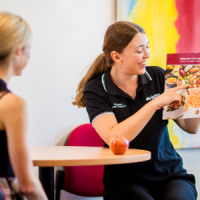
Giving Students an Employability eDGE - ePortfolios for Dietetic Graduate Employability Faculty Spark - View, reflect and apply
Last updated on 21/02/2020
-
You must be signed in to access this function
0
Description
The ePortfolios for Dietetic Graduate Employability (eDGE) project was introduced into the Nutrition & Dietetic Program in 2016 via PebblePad, with the aim of better evidencing student competency and enhancing employability.
Challenge
How can we better evidence student competency and enhance their employability?
Approach
How do we give our students an employability edge?
In 2016 PebblePad was introduced into the Bachelor of Nutrition and Dietetics from Year 1 of the degree, in order to help students evidence their competency and through this, enhance their employability. PebblePad has been used for a range of assessments that focus on employability and better preparing our graduates for the workforce. These include worksheets that assess motivation for enrolment and career planning, CV development, and professional development logs.
From: PebblePad Channel Published on Oct 26, 2017
Description: Giving Students an Employability EDGE - E-portfolios for Dietetic Graduate Employability. Implementing PebblePad within Bachelor of Nutrition & Dietetics. By Lana Mitchell, First Year Coordinator, Nutrition & Dietetics.]
The Bachelor of Nutrition and Dietetics is a four year degree that credentials students to work as dietitians, with the degree structured around competency development. The National Competency Standards for Dietitians in Australia encompass four key domains, including fifty-five individual competencies (1). Students develop their skills against these competencies throughout the degree, with the final competency assessment in fourth year placement.
Setting learning goals, and logging Continuing Professional Development (CPD) are a key requirement of the Dietetics Association of Australia. Candidates need to complete thirty hours of CPD per year, therefore this has been incorporated from Year 1 of the program, with students required to complete, log, and reflect on fifteen hours of CPD per semester. This contributes to ten percent assessments within three courses with students setting their own learning goals early on in semester, and planning their CPD opportunities to complete.
Using the PebblePad Activity Log function, students log each at CPD activity and reflect on how it contributed to their learning. At the end of semester students then evaluate their progress for each of their learning goals. The PebblePad workbook is used to evidence competency development as students are required to provide evidence to demonstrate competency and reflection on learning.
PebblePad has also been used for a range of submission points including the upload of simulated consultations and traditional assessment documents. Within the workbook, a range of reflection formats are used, including short reflections, structured essays and video reflections. With the implementation of these elements in 2016, we found that many students lacked the bigger picture in terms of why PebblePad was useful for demonstrating competency in employability. As a result the Dietetic Competency Workbook was introduced, based on the premise of Year 4 Placement assessment forms. Students to evidence and reflect on their development in a range of dietetic competency standards. Students are required to be concise in their reflections for each competency following the format of STARL-P (i.e. Situation, Task, Action, Result/ Reflection, Learning, Plan). Students provide a brief background to the activity, along with insightful reflection of their personal learning that they have obtained related to the competency.
Enabling Technology
PebblePad was used as the platform in which to create supporting workbooks for this initiative. This is an example of a Dietetic Competency Workbook.
See also:
Pebblepad (Fact sheet). Getting Started with VLE tools and the Course Design Standards.
Pebblepad (Module). Getting Started with VLE tools and the Course Design Standards.
Implement
- Being innovative in your use of PebblePad for teaching and assessment has many benefits, but don't underestimate the time that it takes to set up.
- While PebblePad is well-suited for marking and for providing feedback, over-assessing can be easily done, and adds to marking time. Therefore rubrics have to be well considered to make marking more efficient.
- Utilising PebblePad within the Bachelor of Nutrition and Dietetics has resulted in many positive outcomes. Students have a clearer understanding of their professional identity, and the desired learning outcomes related to the competencies. Therefore they take greater control of their learning experience.
- Requiring students to be proactive about their career development and seek out professional development activities enhances students’ CVs and means that there is an ample supply of willing volunteers within the Nutrition and Dietetics Department.
- Students have become very good reflectors, hopefully better equipping them to excel during their placements and as health professionals.
- There is a clear benefit to being to collate all assessment items in one place, including marks and feedback, allowing the full picture of student competency development to be seen.
Your Learning and Teaching Consultant can suggest ways of optimising the use of PebblePad for your teaching practice.
Griffith Graduate Attributes
PebblePad may assist in the development of the following Griffith Graduate Attributes:
- Effective communicators and collaborators
- Innovative, created and entrepreneurial
Support Resources
-
National Competency Standards for Dietitians in Australia 2015
The National Competency Standards for Dietitians in Australia were originally published in 1993 and reviewed in 1998, 2005 and 2009. This revision was developed in 2014 and endorsed by Dietitians Association of Australia (DAA) in 2015.
Contributed by
-
Griffith Health
School of Allied Health
Dr Lana Mitchell
(07) 567 87137
lana.mitchell@griffith.edu.au
http://orcid.org/0000-0002-7892-2131
Griffith Experts profile -
Learning Futures
Licence
© 2024 Griffith University.
The Griffith material on this web page is licensed under a Creative Commons Attribution NonCommercial International License (CC BY-NC 4.0). This licence does not extend to any underlying software, nor any non-Griffith images used under permission or commercial licence (as indicated). Materials linked to from this web page are subject to separate copyright conditions.
Preferred Citation
(2020). Giving Students an Employability eDGE - ePortfolios for Dietetic Graduate Employability. Retrieved from https://app.secure.griffith.edu.au/exlnt/entry/6025/view

